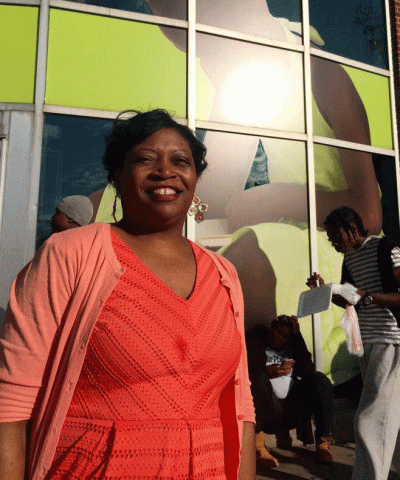The death of 25-year-old Freddie Gray, who died April 19 while in police custody, sparked protests and riots in Baltimore late last month. At the epicenter of the riots, directly across the street from a torched, looted CVS, sits the Pennsylvania Avenue branch of Baltimore’s Enoch Pratt Free Library. While area businesses and schools closed their doors on April 27, the library stayed open. We talked to Branch Manager Melanie Townsend Diggs about the events of the day and hopes moving forward.
Programming Librarian: When did you first learn how close your branch was to the center of the protests?
Image

Melanie Townsend Diggs: The rioting started Monday afternoon about 10 blocks from us. People started calling us and warning us that the crowd was coming our way. (Enoch Pratt Library CEO) Carla Hayden called us to talk about a plan, and we decided if the group approached, we would lock the library doors. At about 2:45 p.m., the mob appeared. It was very loud; they were right outside. It was nerve-wracking, but we tried to remain calm. We asked our security guard to change into street clothes, because we didn’t want him to be attacked.
There were about 30 people inside the library, including staff. After locking the doors, we went room by room and started telling people, calmly, about the situation. We said that they were free to leave through a side door, if they wanted to, but everyone felt comfortable and safe and wanted to stay. We eventually decided to close three hours early, at 5 p.m., to make sure everyone would get home before it got dark.
PL: What happened the next morning?
MTD: Our CEO called and asked my opinion about whether we should open. Neither of us hesitated – we wanted to open. Nothing else was open in our area, but it was important for us to be there.
PL: If we had walked into the library on Tuesday, what would we have seen?
MTD: In some ways it was a typical day, with people coming and going. But you also would have seen customers and community leaders coming in and thanking us for being open. A woman bringing us flowers, pastries. The media coming in to charge up their batteries, use the restrooms. You would have seen a young man coming in to fill out a job application online, and then coming back the next day to say that he had an interview scheduled for May 5. All of these things happened. If we had not opened our doors, we would have missed all those things.
Schools were closed on Tuesday, so we also had a few more kids than usual. Several had been here on Monday night, too. It was nice to see they felt comfortable enough to come back.
PL: Do you see an opportunity for programming related to the riots?
MTD: Yes, definitely. We have already been contacted by a local author who specializes in children’s psychology. She is going to do a storytelling event and talk to kids and families about how to deal with crisis. I also hope we can be a safe place, a place of dialogue for young people, community leaders, the police, for everyone to come together and talk about what’s going on. People are happy today (on May 1, the day the state’s attorney filed charges against six police offers), but there’s still a long road ahead of us. There’s going to be a trial. There is a lot of uncertainty.
PL: Has this week changed the way you view your work?
MTD: I’ve been a librarian for more than 20 years, and as difficult and scary as this week has been, I love the fact that it has shown people that we’re here. Sometimes people don’t realize all we do as librarians. We’re the light in the community, the pathway to resources, we provide access to a world of possibilities. Situations like this shed light on a profession that often gets overlooked.
